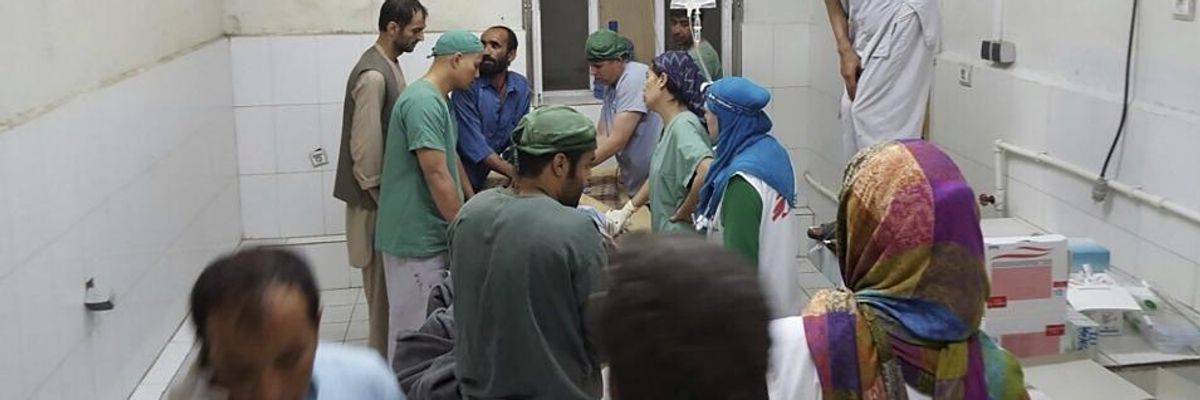The destruction of the Doctors Without Borders (MSF) hospital in Kunduz, with 22 dead so far, including doctors, other staff and patients, capped a week that also saw the bombing of another hospital in Afghanistan, plus the U.S.-backed Saudi Arabian bombing of a wedding party in Yemen set up in tents far out in the desert, away from anything remotely military. (What IS it about wedding parties that U.S. and allied bombers keep hitting them?).
The Pentagon relied on its language of "collateral damage," trying once again to distance itself from any responsibility for this most recent atrocity in Afghanistan. But there is no distance. This is the direct and inevitable result of an air war waged by U.S. pilots flying U.S. planes dropping U.S. bombs on an impoverished and war-devastated country still immersed in the war that began 14 years ago this week. Since that time the U.S. has spent $65 billion to train and equip a military and police force accountable to U.S. goals and the U.S.-installed government. But it hasn't worked.
Kunduz is a large city in northern Afghanistan, and while residents and others had noted moves by the Taliban to surround the city in recent months, it wasn't until last week's seizure of the town by Taliban forces that U.S.-backed officials in Kabul took any notice. The corruption-rife and widely discredited Afghan government then sent troops from its U.S.-trained army to try to retake the city, even announcing two days later that the Taliban had been routed. But residents and other observers reported the Taliban remained largely in control, and the U.S. sent warplanes on bombing raids, ostensibly to bolster its junior partners.
Eye (and ear) witnesses from the international humanitarian organization reported that despite having provided precise GPS coordinates to U.S. and Afghan military authorities to prevent exactly this kind of attack, the hospital was "repeatedly hit very precisely during each aerial raid, while surrounding buildings were left mostly untouched." The Pentagon refused to take responsibility, saying only that its airstrikes "may have resulted in collateral damage." President Obama expressed condolences to the victims but refused to apologize for the strike.
According to Heman Nagarathnam, MSF Head of Programs in northern Afghanistan, "the bombs hit and then we heard the plane circle round. There was a pause, and then more bombs hit. This happened again and again. When I made it out from the office, the main hospital building was engulfed in flames. Those people that could had moved quickly to the building's two bunkers to seek safety. But patients who were unable to escape burned to death as they lay in their beds." Those who burned to death included three children and the patients in the hospital's intensive care ward.
The attack on the hospital, with its horrific civilian casualties, is the inevitable result of an air war against heavily populated cities. But more broadly, it is one more example of the consequences of a strategy of trying to defeat terrorism by war. In Afghanistan as in the escalating wars in Syria and Iraq, the claim we so often hear from U.S. officials is true: "there is no military solution." But the actions of the US government - military action being almost all we see - belie that claim.
In Syria, there may be a small bit of hope for negotiations - despite the harsh rhetoric, both Obama and Putin made subtle but significant concessions in their UN speeches, and it may be that the current escalations on both sides are prelude to some kind of negotiations. (President Obama reiterated what Kerry outlined more specifically, that Assad's ouster is not a precondition or something that has to happen immediately. President Putin, even while stating support for Assad, stated clearly that he believes what stands against terrorism in Syria and so what must be protected is the Syrian government and "its" army - not "his" army, thus leaving open a shift in Russian support away from Assad alone to support for the Syrian state and military, assuming Moscow can count on continuing protection of its various interests in and around Syria.)
But the fighting continues. In Syria, the U.S. and Russia are both conducting airstrikes ostensibly against ISIS, but the civilian suffering significant casualties. Despite its claims of backing only "moderate" opposition forces, the Pentagon just admitted that one of the ephemeral U.S.-armed coalitions of just such "moderate" rebel fighters is actually working to arm the al-Nusra Front, al-Qaeda's Syrian affiliate. According to the Israeli daily Ha'aretz, "Unfortunately, we learned late today that the NSF (New Syrian Forces) unit now says it did in fact provide six pickup trucks and a portion of their ammunition to a suspected Al-Nusra Front (group)," Pentagon spokesman Captain Jeff Davis said.
It remains a very grim time - the situation in Kunduz remains highly unstable, and with the destruction of the MSF hospital, continued fighting now means injured civilians have lost the most important provider of emergency medical care available. More Afghan civilians will die. In Syria, IF the possibilities of negotiations are rising, there's likely to be a greater military escalation before and even during such talks, meaning more Syrian civilians will almost certainly be killed.
The wars are far from over.

